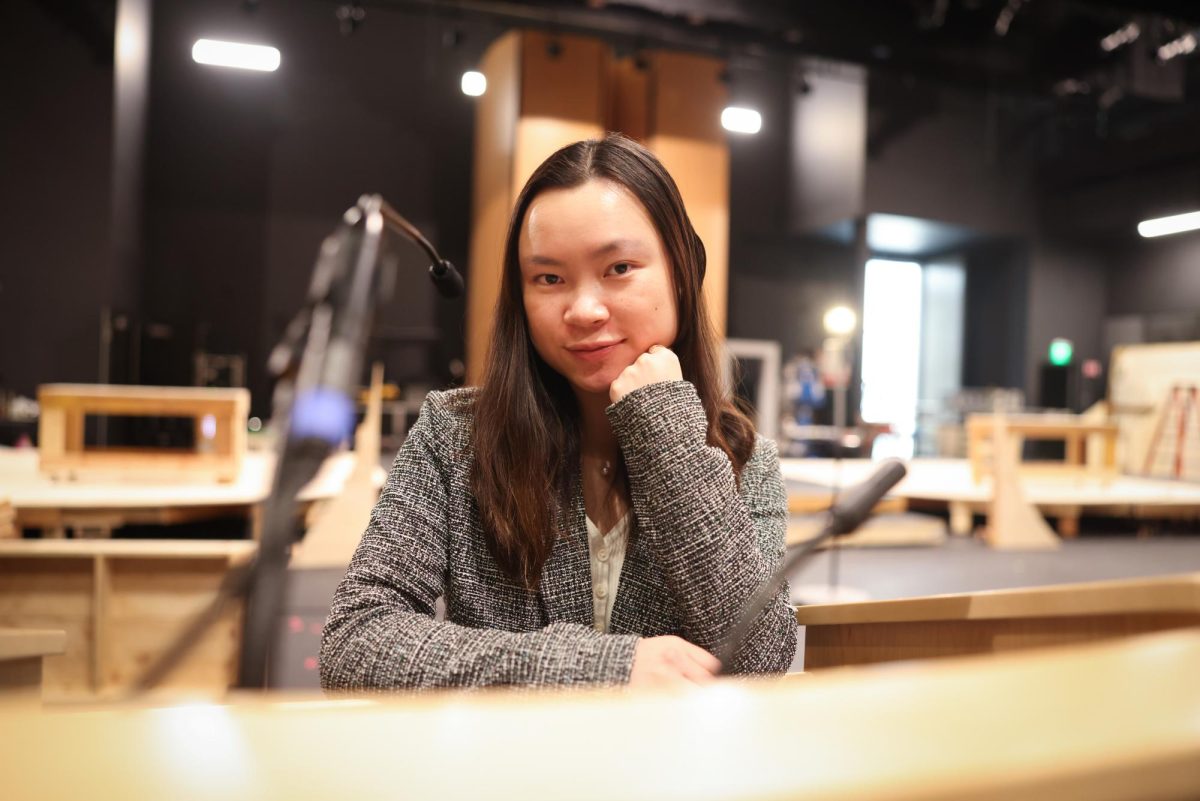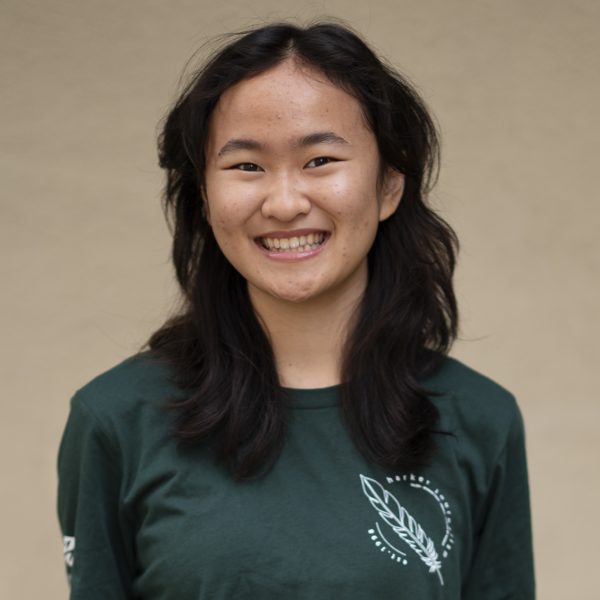To many, public speaking can be an intimidating task. To others, it’s a skill that comes naturally. But what would it feel like to plan out and give a seven minute speech in your second language, then justify your arguments against intense rebuttals?
This was the exact situation Fiona Yan (12) found herself in as a freshman in speech and debate. In her event of choice, extemporaneous speaking, or extemp, individuals have thirty minutes to prepare a speech and seven more to deliver it. Although Fiona did not have much experience with speech in middle school, she joined the Harker speech and debate team in ninth grade, driven by the strength of the school’s program.
Having moved to California from China in fourth grade, Fiona found herself in a new environment where she had to speak English, her second language, at school. In the beginning, Fiona found speaking confidently in her second language to be difficult, especially while in a stressful environment.
“Speech was very challenging throughout because English is not my first language,” Fiona said. “For extemp, you get only thirty minutes to prepare, and you have to speak on the spot about any current event. So talking like a native speaker and doing everything there and then was very challenging for me at first, and that was also a big area of growth for me.”
Fiona began her public speaking career in freshman year with debate before transitioning to speech in tenth grade. However, because of the COVID-19 pandemic, she only began participating in tournaments as a junior when speech began to become a larger time commitment, where she had the valuable opportunity to attend tournaments and travel all across the country.
“Junior year was really memorable because that was when I started going to in-person tournaments after COVID had mostly ended,” Fiona said. “Every month or two, we would travel to a different part of the country for a tournament; for example, I got to go to San Diego, Kentucky, Minneapolis — places that I would have never gone to if it wasn’t for speech.”
During these trips, Fiona was able to grow much closer to her teammates, many of whom she would have never met outside of speech and debate. She explains the importance of bonding with fellow classmates and emphasizes that even in stressful competitive environments, friendship and fun are still crucial for teams to work together.
“What made [traveling to tournaments] super special was traveling together without your family but with other people,” Fiona said. “And you get really close to the other people on your team. So that was a really special experience for me, to be able to be part of a group of friends and teammates who I’ve shared so many memories with. In that way I think speech is important both on an individual level but also on a team level.”
Throughout her speech career, Fiona has looked up to her speech and debate teacher Scott Odekirk, who has coached her for the past three years. Odekirk has not only given crucial advice to improve her performance and confidence but has also served as a mentor who is always there to support her during tournaments.
“Mr. Odekirk has so much experience that he always knows what is going to help you specifically the most,” Fiona said. “So he’s always there to push you when you need a push, and he’s there to always encourage you whenever you’re scared or nervous for a round. Because of that he’s definitely helped make me a lot less scared of giving speeches on the spot.”
Fellow speech competitor and friend Sasha Masson (12), who has known Fiona since ninth grade, values her helpfulness and generosity. She highlights Fiona’s willingness to lend a hand not only in speech but also in other areas of school and life.
“Whenever I ask her for favors, like when a lot of people dropped out of my mock trial team at the last minute, Fiona still volunteered to help out even though she had a speech tournament coming up,” Sasha said. “I just thought that it was really nice that even though she had so much going on, she was able to help me. And in general when I was having a difficult time, she’s helped me in countless situations where I didn’t know what to do, and she gave me really valuable advice.”
Leading by example with her diligence and work ethic, Fiona encourages others around her to be the best version of themselves. Close friend Ashley Hong (12), who often spends time and studies with Fiona on the weekends, recalls many instances when Fiona displayed her consideration for others and helped her improve as a student.
“I feel like Fiona encourages me to be a better student because she’s such a good, focused student herself,” Ashley said. “She doesn’t procrastinate, so that rubs off on me when we’re studying together, and she’s always willing to answer my questions. Even in English, because she knows that I don’t participate a lot, she’ll encourage me to share my ideas and speak up.”
Upper school mathematics teacher Bradley Stoll, who taught Fiona calculus in her junior year, appreciates how her thoughtfulness for others positively impacted everyone around her.
“I knew she was going to be super organized and on top of things from the beginning,” Stoll said. “But throughout the year, I’ve got to see her as a really good team player who loves working with other people and helping them. Several times she’d even bring in baked goods, but no matter what she does she just wants to leave the world a better place than what it was.”
Throughout her high school career, speech has not only helped Fiona improve her public speaking skills, but it has also allowed her to become more a thoughtful and confident leader.
“Even though I was able to connect to so many people through speech, individually it also made me a better communicator,” Fiona said. “A lot of speech is just being comfortable talking to other people, sharing your ideas, the way you talk and the way you respond to other people. It’s made me more aware of other people and their thoughts and feelings, and I know it’s made me a better person too.”


















![“[Building nerf blasters] became this outlet of creativity for me that hasn't been matched by anything else. The process [of] making a build complete to your desire is such a painstakingly difficult process, but I've had to learn from [the skills needed from] soldering to proper painting. There's so many different options for everything, if you think about it, it exists. The best part is [that] if it doesn't exist, you can build it yourself," Ishaan Parate said.](https://harkeraquila.com/wp-content/uploads/2022/08/DSC_8149-900x604.jpg)




![“When I came into high school, I was ready to be a follower. But DECA was a game changer for me. It helped me overcome my fear of public speaking, and it's played such a major role in who I've become today. To be able to successfully lead a chapter of 150 students, an officer team and be one of the upperclassmen I once really admired is something I'm [really] proud of,” Anvitha Tummala ('21) said.](https://harkeraquila.com/wp-content/uploads/2021/07/Screen-Shot-2021-07-25-at-9.50.05-AM-900x594.png)







![“I think getting up in the morning and having a sense of purpose [is exciting]. I think without a certain amount of drive, life is kind of obsolete and mundane, and I think having that every single day is what makes each day unique and kind of makes life exciting,” Neymika Jain (12) said.](https://harkeraquila.com/wp-content/uploads/2017/06/Screen-Shot-2017-06-03-at-4.54.16-PM.png)








![“My slogan is ‘slow feet, don’t eat, and I’m hungry.’ You need to run fast to get where you are–you aren't going to get those championships if you aren't fast,” Angel Cervantes (12) said. “I want to do well in school on my tests and in track and win championships for my team. I live by that, [and] I can do that anywhere: in the classroom or on the field.”](https://harkeraquila.com/wp-content/uploads/2018/06/DSC5146-900x601.jpg)
![“[Volleyball has] taught me how to fall correctly, and another thing it taught is that you don’t have to be the best at something to be good at it. If you just hit the ball in a smart way, then it still scores points and you’re good at it. You could be a background player and still make a much bigger impact on the team than you would think,” Anya Gert (’20) said.](https://harkeraquila.com/wp-content/uploads/2020/06/AnnaGert_JinTuan_HoHPhotoEdited-600x900.jpeg)

![“I'm not nearly there yet, but [my confidence has] definitely been getting better since I was pretty shy and timid coming into Harker my freshman year. I know that there's a lot of people that are really confident in what they do, and I really admire them. Everyone's so driven and that has really pushed me to kind of try to find my own place in high school and be more confident,” Alyssa Huang (’20) said.](https://harkeraquila.com/wp-content/uploads/2020/06/AlyssaHuang_EmilyChen_HoHPhoto-900x749.jpeg)





